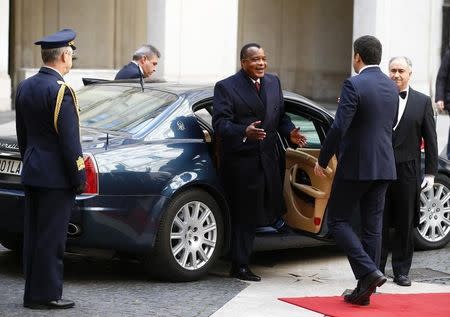Congo Republic leader calls for national dialogue, with term limits one subject

BRAZZAVILLE (Reuters) - The president of the Congo Republic has called for a national dialogue, one subject of which would be potential constitutional changes that would allow him to stand next year for a third term. President Denis Sassou Nguesso, 71, has not yet said if he plans to seek another seven-year term. Congo's 2002 constitution limits the president to two terms in office and excludes candidates over 70 years of age. However, Sassou Nguesso has already said he expects a referendum to decide on whether the nation's charter should be revised. Opposition figures have criticised what they say is a bid to extend his rule. "Dialogue in our country, in our traditions, I allow myself to remind you, brings progress, mutual understanding and calm," the president said in a televised address late on Tuesday. Around 400 representatives from the political class, trade unions, civil society, ex-combatants, and traditional and religious authorities will be convoked for the July 11 to 14 conference. In preparation, Sassou Nguesso announced the creation of a committee of experts charged with looking at the organisation of the elections and the future of the nation's institutions and constitution. The Congolese president is one of several Africa leaders in the region suspected of wanting to stay in power beyond constitutional term limits. Burundi has been locked in its worst political crisis since a civil war ended a decade ago, with dozens killed since protests erupting in late April against President Pierre Nkurunziza's bid to seek a third term. Last year, Burkina Faso's long-time leader Blaise Compaore surrendered power after days of mass protests against a plan to change his country's constitution. Sassou Nguesso, a former military commander, took power in the Central African nation in 1997 at the end of a civil war before winning disputed polls in 2002 and 2009. He had previously ruled the former French colony from 1979 to 1992. Congo is on track to reverse a decline in oil production and leapfrog Equatorial Guinea to become sub-Saharan Africa's third-largest crude producer by 2017. Despite its oil wealth, however, half the population lives in poverty, according to the World Bank. (Reporting by Philon Severin Bondenga; Writing by Joe Bavier; Editing by Larry King)

 Yahoo News
Yahoo News 